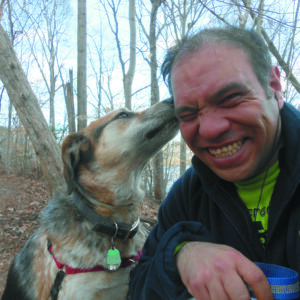Before we talk about pancreatitis in dogs — its causes, symptoms, and treatment options— we need to examine the pancreas itself, a critically important internal organ. Residing close by the stomach, the pancreas produces both the enzymes needed to break down food and the hormones that turn it into energy. A swollen or malfunctioning pancreas can lead to a host of problems for dogs, including diabetes, organ failure and death. Let’s examine this potentially deadly disorder more closely and learn about the causes, treatment and prevention options for pancreatitis in dogs.
First, what is pancreatitis?

Pancreatitis is inflammation of the pancreas. Irritation and swelling blocks the wonted pathways of digestive enzymes produced within the pancreas. Instead of following their natural course into the small intestine and digestive tract, these enzymes begin seeping out into the abdominal cavity. The enzymes don’t stop working just because they are misdirected, which means they start breaking down everything they contact, including the pancreas itself. Essentially, an attack of pancreatitis is brought on when the dog’s digestive enzymes begin eating away at the pancreas itself and cause damage to other internal organs.
Causes of pancreatitis in dogs
Two major forms of pancreatitis occur in dogs, acute and chronic, and each can be mild or severe. The former can be treated and managed with proper and timely veterinary attention; the latter may require maintenance and palliative care for the rest of a dog’s life.
Acute pancreatitis in dogs
Acute pancreatitis in dogs is a sudden-onset form of the illness, and can affect dogs of any age or breed. Causes of acute canine pancreatitis in dogs include, but are not limited to:
- Diabetes
- Table scraps
- Infection
- Injury or physical trauma to the abdomen
- Kidney or liver issues
- Reaction to medications
- Scorpion stings
Chronic pancreatitis in dogs
Chronic pancreatitis in dogs can signal a wider set of canine health issues and spur other organs to fail. This form of the disease tends to affect older and senior dogs, female dogs more than males, and particularly dogs with poor or unrestricted eating habits. Other causes of the chronic form include:
- Epilepsy
- Excess calcium in the bloodstream
- High-fat or irregular diet
- Obesity
- Pre-existing digestive or gastrointestinal problems
- Thyroid problems
What else to know about pancreatitis in dogs

Both acute and chronic forms of pancreatitis in dogs may arise as a result of an inappropriate diet. An attack of acute pancreatitis can occur if a dog eats foods that are high in fat. It is a special risk during the holidays when dogs may beg for or be offered human table scraps at family feasts. Chronic pancreatitis can develop if a dog’s diet is irregular or inconsistent over the course of her life.
Since the pancreas produces insulin, chronic or repeated attacks of pancreatitis can lead to diabetes. Yes, diabetes mellitus in dogs can be both a cause and a result of pancreatitis. If the chronic form isn’t treated or managed, the pancreas may eventually cease to produce crucial digestive enzymes, a condition called pancreatic insufficiency, where a dog can eat and still fail to derive nutrients or energy from food.
What are the symptoms of pancreatitis in dogs?
Signs of pancreatitis in dogs are similar to those of a number of other digestive or abdominal health issues. The following symptoms may indicate a bout of pancreatitis, but only a veterinarian can accurately diagnose the disorder.
Acute
- Digestive issues: diarrhea, vomiting, loss of appetite
- Fever
- Loss of energy, lethargy
- Physical changes may include tightening of the abdomen, a dog who flinches in pain when you touch her belly and a hunched-over appearance
Chronic
- Anorexia: A dog eats a lot, but is still losing weight
- Below-average body temperature
- Dehydration: A dog has a dry mouth
- Difficulty breathing
- Irregular heartbeat
- Passing undigested food in poop
The first of these — a large appetite, but no weight gain — is a sign of pancreatic insufficiency. The dog’s chronically inflamed pancreas might be causing a permanent reduction in the enzymes needed to digest her food. If you are seeing whole pieces of food in a dog’s feces, it is a sign that her digestive system is neither processing the food she is eating, nor converting it to the energy she needs.
How vets diagnose and treat pancreatitis in dogs
The symptoms listed above are not unique to pancreatitis, and indeed may signal a number of digestive or abdominal illnesses. If symptoms persist for more than a couple of days, you should consult with a veterinarian. A cursory physical examination will check for abdominal sensitivity. Subsequent efforts will concentrate on bloodwork to test for the presence of excess enzymes in the bloodstream. An ultrasound may be performed to check for signs of swelling to the pancreas or damage to surrounding organs. Since invasive procedures and testing can actually lead to an attack of pancreatitis, a biopsy of the pancreas is a measure of last resort.
Treating pancreatitis in dogs depends on whether the affliction is acute or chronic, and determining the root cause of the swelling. For example, if it is found to be acute and caused by an adverse reaction to medication, changing or altering the dog’s prescription will be attempted. If it is acute and can be treated with medication, then, depending on the symptoms, pain relievers, antibiotics or anti-inflammatories may be prescribed. Intravenous fluids can be attempted to resolve any temporary issues with dehydration. If the cause is dietary, then a short-term shift in diet can be tried until symptoms subside.
Management and prevention of pancreatitis in dogs
If the dog’s pancreatitis is chronic, then treatment and subsequent management might require vigilant and sustained efforts. A dog who has been overweight or obese for most of his life, for instance, may need a permanent change in diet to foods that are low in fat and high in carbs. Should pancreatic insufficiency be discovered, a dog may need nutritional and digestive supplements for the rest of her life. Severe chronic pancreatitis might necessitate surgery to repair damage to the pancreas and any other affected organs. Surgery is a last resort, however, and reserved for extreme cases.
Preventing pancreatitis in dogs is just as tricky as diagnosing it accurately. The sudden onset can of acute pancreatitis can be provoked by unforeseen accidents like freak physical injury, fatty holiday treats or negative reaction to medication. In situations like these, the best a dog owner can do is limit their dogs’ access to trash and make sure their dogs stick to a healthy diet. Since obesity is a risk factor over the course of a dog’s life, regular exercise is essential.
Read more about dog health and care on Dogster.com:
- 10 Natural Remedies for Dogs
- What Is Alabama Rot in Dogs and Is Your Dog at Risk?
- Dog Vomiting: What to Know and What to Do When Your Dog Throws Up
Plus, should you be concerned about pancreatitis? Here are the causes and symptoms of pancreatitis in humans >>
About the author: Melvin Peña trained as a scholar and teacher of 18th-century British literature before turning his research and writing skills to puppies and kittens. He enjoys making art, hiking, and concert-going, as well as dazzling crowds with operatic karaoke performances. He has a one-year-old female Bluetick Coonhound mix named Idris, and his online life is conveniently encapsulated here.
Featured Image Credit: Montri Nipitvittaya / Shutterstock.






